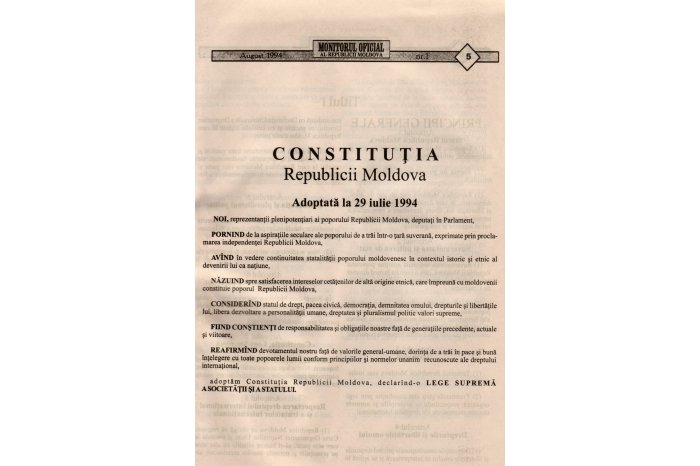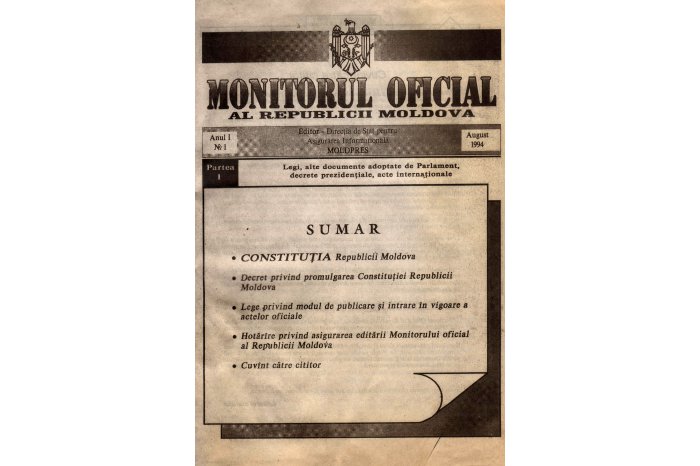29 July 1994. Moldova's Constitution is adopted
15:21 | 27.07.2021 Category:
The first democratically elected parliament carried out its work within the legal framework of the Constitution of the Moldovan Soviet Socialist Republic (RSSM). The events unfolded so dynamically and unpredictably, that the legislative body could not afford the luxury to turn into a Constituent Assembly. Normally, a parliament which assumes the task to elaborate a new constitution deals exclusively with this fact, proposes the draft for referendum and then starts the procedure of snap elections based on the new constitution. There was no time for such procedures and we were also a union republic, under the legal action of the Constitution of the USSR, a propagandistic and a non-functional one.
Nevertheless, the first parliament managed to amend the Soviet Constitution several times. The tricolour was adopted as state flag, the article which envisaged the leading role of the communist party was removed and the state’s central institutions were radically transformed. Yet, the movement forward was difficult because of a Brezhnev-type constitution, which had nothing in common with the rule of law state.
Proceeding from these reasons, on 19 June 1990, several days before the adoption of the Declaration of Sovereignty, the parliament passed a decision on the setting up of the Commission for the working out of the draft of the new Constitution of Moldova. The commission was made up of MPs, experts in constitutional law, economists, historians and Mircea Snegur, the then parliament speaker, was elected its head. It was obvious that, at that time, there was no deep knowledge about the nature of the rule of law state, powers’ separation, market economy, private property. Gradually, other specialists were attracted to the commission’s meetings, including from Romania, which was also in a similar process of elaboration of a new Constitution.
The Constitutional Commission, with the wide contribution of experts’ groups, managed to give final touches to a draft which, to a great extent, met the international exigencies and standards in the field. For the first time ever, the relations between the citizen and the state were regulated in such an important document as the Fundamental Law; the Constitution stated the principle of state’s responsibility before the citizen, the guarantor of the observance of which is the Constitutional Court, along with the power’s branches: legislative, executive and judicial. The idea set forth in the French declaration was the central one in Moldova’s Constitution and namely: ‘’ Liberty consists in the power to do anything that does not injure others; accordingly, the exercise of the rights of each man has no limits except those that secure the enjoyment of these same rights to the other members of society.’’ The new Constitution’s authors gave up the old principle, which stayed at the basis of the Soviet constitutions: ‘’To do what the laws allows to do’’ and adopted the principle ‘’Not to do only what the law bans,’’ allowing the free development.
The draft was submitted to parliament on 20 August 1992. The lawmakers were to take knowledge of the draft Fundamental Law and come up with proposals for the plenary meeting. To facilitate the giving of the final touches to the draft, a working group was elected, led by an experienced jurist, Tudor Pantaru.
The discussions in plenum started on 2 March 1993. The draft was based on six principles which ensured the architecture of the rule of law state. Among them, there were: the democratic character of the state power, powers’ separation, political pluralism, market economy, the fundamental human rights and the private property. The discussions in parliament, unfortunately, were focused mainly on the identity issue and the 2 March day did not yield palpable results. By the end of the day, the MPs ruled to create a commission for giving final touches and editing the text, led by the then parliament speaker, Petru Lucinschi.
On 3 March, the discussion was quite politicized too and far from the draft’s real problems. The national minorities’ representatives were permanently leading the discussion to the zone of inter-ethnic relations and endlessly perpetuated the confrontations of which the society was already tired. Nevertheless, the proposals were systematized and on 12 March, the parliament approved the text proposed as the basic one. Two months were established for the public discussion of the draft Constitution.
The snap parliamentary elections from 27 February 1994 proved that the imminent worsening of the economic situation triggered a disappointment in the democratic approach. The forces which managed to speculate these difficulties of the transition gained an overwhelming victory, getting 84 mandates. The Democratic Agrarian Party and the Bloc of the Socialist Party and the Unity Movement did not propose to the society a viable left-wing alternative and limited themselves to certain interpretations of the identity issues and to practical actions of tempering or miming reforms. Namely they had the task to eventually adopt the first Constitution of Moldova.
In fact, the parliamentary majority was not quite able to change a lot of things in the draft proposed by the previous parliament, as most constitutional principles were already in force in Moldova, due to laws adopted in 1990-1993. The separation of powers, political pluralism, private property, elements of the market economy were widely practiced in all life spheres and there was no way back. The only thing which the quasi-communist forces managed to do was to introduce the anti-scientific syntagm ‘’Moldovan language’’ in the country’s Fundamental Law.
On 29 July 1994, the Agrarian-Socialist majority voted the Constitution of Moldova. President Mircea Snegur hurried to immediately promulgate it, just in the session hall. Afterwards, Snegur regretted the presence in the Fundamental Law of the falsehood concerning the correct name of the language we speak. The Constitution entered into force and during 27 years Moldova has been guided by the principles and norms established at that time. The Constitution was spoiled and mutilated in the interest of the politicians in power more times. Even if it was not perfect, nevertheless, there was a systemic approach of the set of legal values. The hasty amendments created certain unbalances and contradictions.


